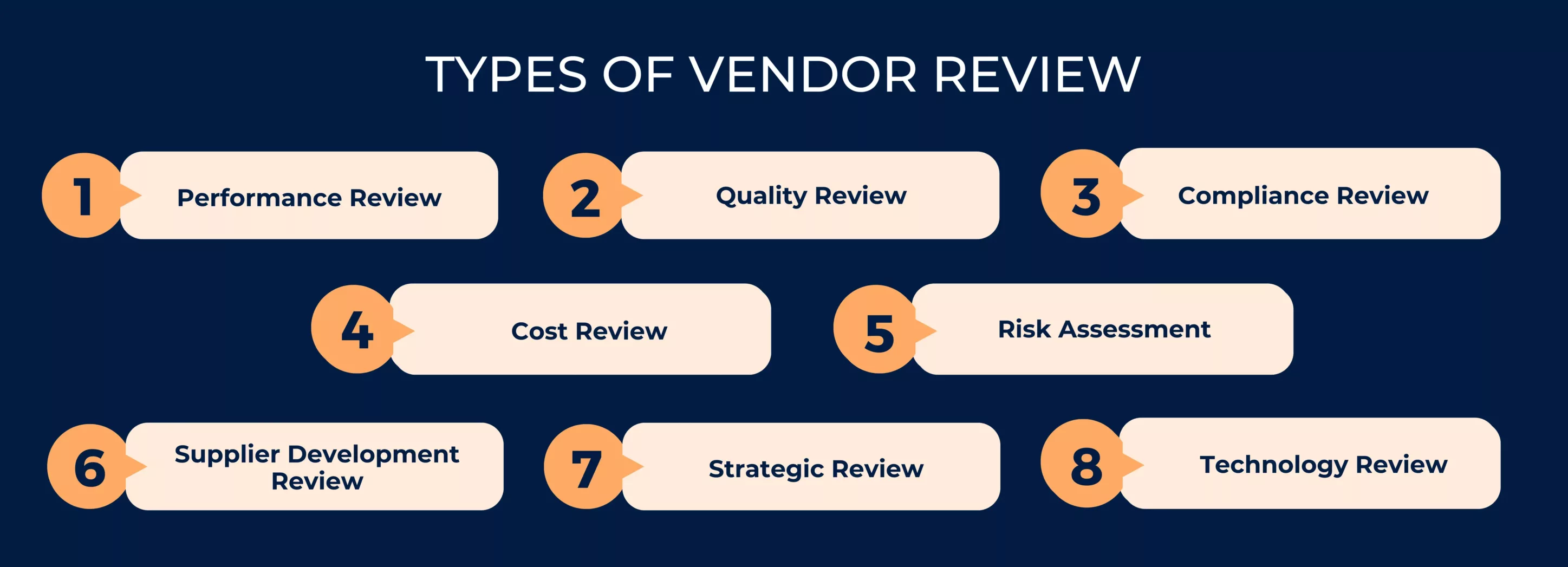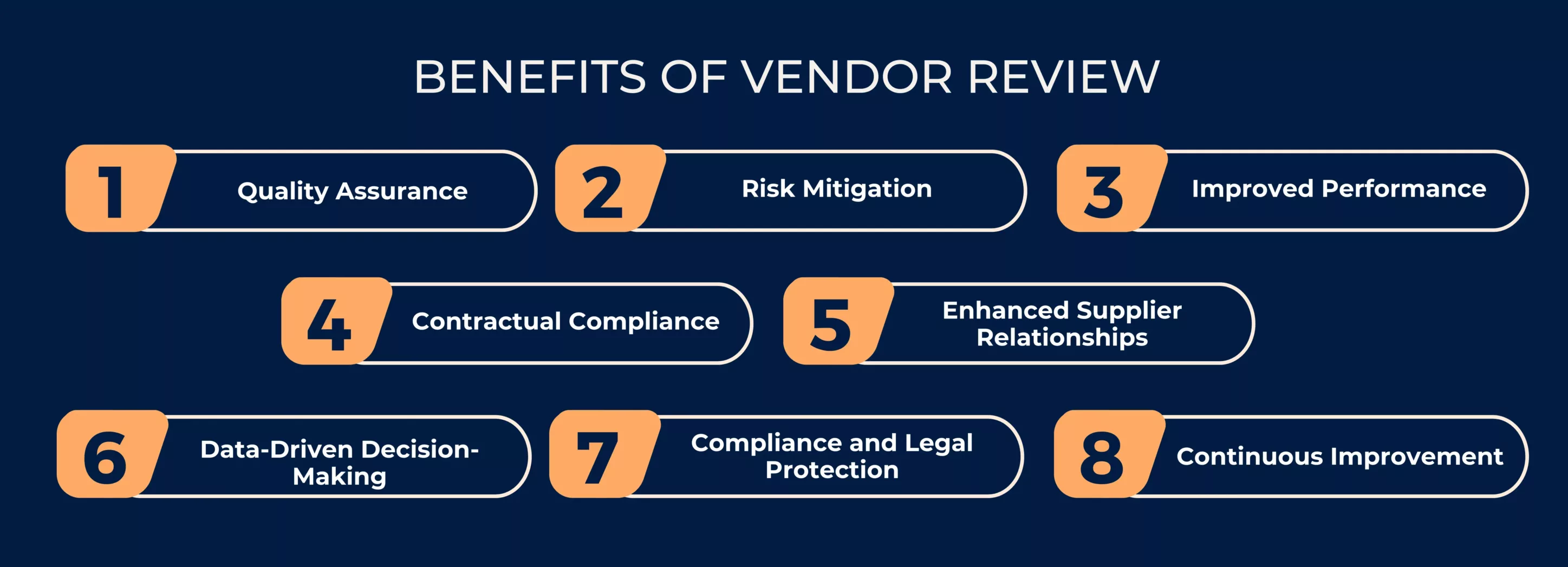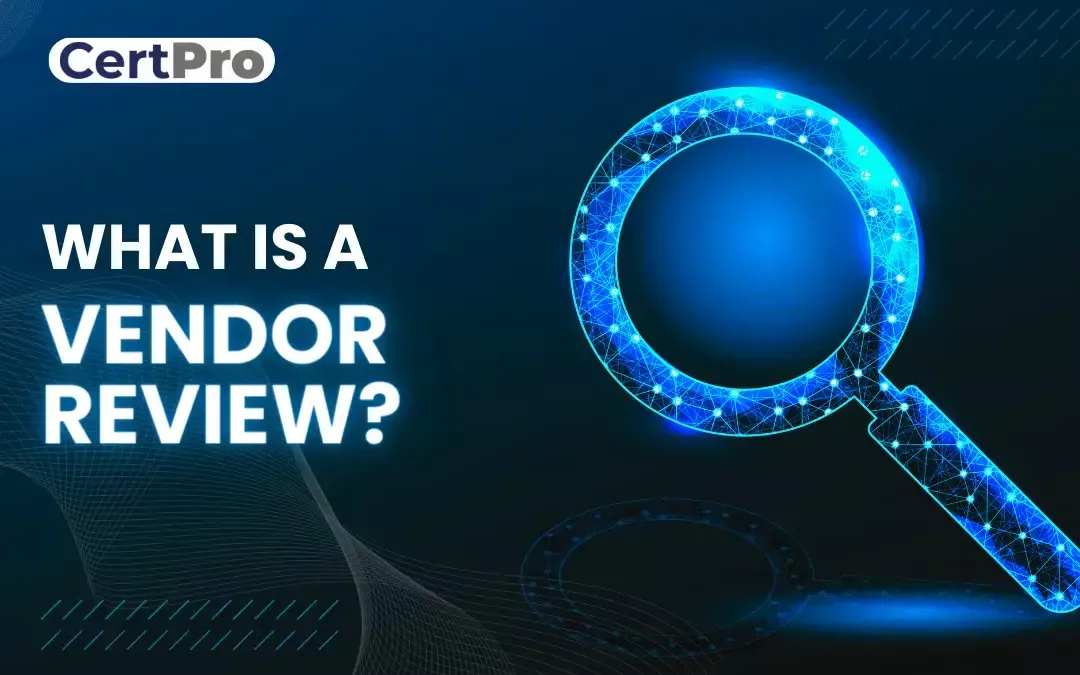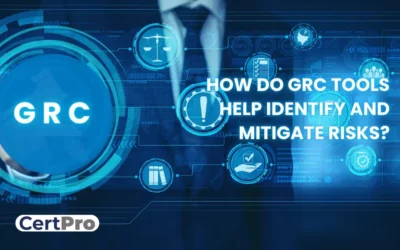In the dynamic landscape of modern business, maintaining successful vendor relationships is paramount. Vendor review, also known as supplier evaluation or vendor assessment, serves as the cornerstone of effective vendor management strategies. This comprehensive vendor process involves assessing a vendor’s performance, capabilities, and adherence to contractual agreements.
It is vital for several reasons. It ensures the consistent delivery of high-quality products and services, helping organizations uphold their own quality standards. Additionally, it aids in cost control, identifying opportunities for cost savings, and enhancing procurement processes. Moreover, It plays a pivotal role in risk mitigation, allowing organizations to identify and mitigate potential disruptions and compliance issues.
This article will delve into the nuances of vendor review, exploring its significance, the multifaceted evaluation criteria involved, the steps in conducting a vendor evaluation, and best practices for effective vendor management. In today’s interconnected global marketplace, mastering the art of review is essential for fostering lasting and mutually beneficial business partnerships.
WHAT IS A VENDOR ASSESSMENT?
Vendor evaluations are in-depth investigations of the suppliers to your business to make sure they adhere to your security standards. Vendor evaluations can be defined in a variety of ways, but we prefer to think of them in terms of how well suppliers adhere to security and compliance best practices. Data handling procedures, physical security, and adherence to recognized security standards like SOC 2 and ISO 27001 are all evaluated during vendor assessments.
While each company may have its own unique vendor evaluation process, they all constitute essential elements of thorough research and preparation. A security questionnaire, an analysis of incident reports, action plans, and customer surveys are typically included. Vendor evaluations are carried out whenever you’re thinking about working with a new vendor, but they’re also done regularly to make sure the vendor is upholding the necessary security and compliance policies.
It also fosters collaboration and supplier development. Rather than being solely punitive, these assessments often serve as platforms for constructive feedback and improvement. Organizations can work closely with their vendors, offering guidance and support to enhance their processes and capabilities, ultimately resulting in more productive and profitable relationships.
Lastly, they are essential for ensuring compliance with contractual obligations, industry regulations, and ethical standards. In today’s highly regulated business environment, non-compliance can lead to legal and financial penalties.
In essence, It is a holistic and strategic approach to managing supplier relationships, enabling organizations to make informed decisions, optimize costs, mitigate risks, and cultivate collaborative and enduring partnerships with their vendors. Through best practices and the integration of technology, organizations can enhance the efficiency and effectiveness of their vendor assessment processes, ultimately enhancing their competitive edge in the marketplace.
TYPES OF VENDOR REVIEW
A critical aspect of supply chain management, which encompasses various vendor types that organizations employ to assess and manage their relationships with suppliers or vendors, is that each type serves specific purposes and focuses on distinct aspects of vendor performance. Here are some of the key vendor types:
1. Key Performance Review: This type of review evaluates a vendor’s overall performance based on key performance indicators (KPIs). It assesses factors such as product or service quality, on-time delivery, and reliability.
2. Quality Review: Quality reviews concentrate on the consistency and adherence of vendors to quality standards and specifications. Quality reviews are critical in industries like food production or pharmaceuticals, where product quality directly affects consumer satisfaction and safety.
3. Compliance Review: Compliance reviews assess whether vendors adhere to contractual agreements, industry regulations, and ethical standards. These reviews are crucial for mitigating legal and regulatory risks.
4. Cost Review: Cost reviews focus on the financial aspects of vendor relationships. They evaluate pricing structures, cost competitiveness, and the accuracy of invoices.
5. Risk Assessment: Risk assessments analyze potential risks associated with vendor relationships. This type of vendor review identifies vulnerabilities in the supply chain, assesses the vendor’s financial stability, and evaluates geopolitics.
6. Supplier Development Review: Supplier development reviews are forward-looking and focus on enhancing vendor capabilities. Organizations collaborate with vendors to improve their processes, technology, and efficiency.
7. Strategic Review: This type of vendor evaluation aligns vendor relationships with an organization’s strategic objectives. It assesses how vendors contribute to the company’s long-term goals and competitive advantage, emphasizing partnership alignment.
8. Technology Review: Technology reviews evaluate a vendor’s technological capabilities and compatibility with an organization’s IT infrastructure. These various vendor types enable organizations to manage supplier relationships effectively, ensuring that vendors meet performance expectations, comply with regulations, and contribute to overall business success.

BENEFITS OF VENDOR REVIEW
It offers numerous benefits to organizations across various industries. These assessments of supplier performance, compliance, and overall value contribute to effective vendor management and can have a substantial impact on an organization’s success. Here are some key benefits of vendor evaluation:
1. Quality Assurance: It helps ensure that the products or services provided meet the organization’s quality standards. By assessing and monitoring quality, organizations can maintain consistent standards and deliver higher-quality products or services to their customers.
2. Risk Mitigation: It assesses various types of risks, including financial, compliance, and operational risks. Identifying and mitigating these risks helps protect the organization from potential disruptions or legal issues.
3. Improved Performance: By monitoring vendor performance, organizations can identify areas where vendors excel and where improvements are needed. This feedback can lead to better collaboration and improved vendor performance over time.
4. Contractual Compliance: It ensures that vendors adhere to the terms and conditions specified in contracts. This reduces the likelihood of contract breaches and disputes, saving time and resources.
5. Enhanced Supplier Relationships: Constructive vendor feedback can foster stronger relationships. Vendors are more likely to collaborate and provide additional value when they receive regular performance reviews and feedback.
6. Data-Driven Decision-Making: It provides valuable data and insights that organizations can use to make informed decisions about vendor selection, renegotiation, or termination.
7. Compliance and Legal Protection: By reviewing vendors for compliance with laws and regulations, organizations reduce the risk of legal consequences and protect their reputation.
8. Continuous Improvement: It should be an ongoing vendor process, encouraging continuous improvement in vendor performance, product quality, and service delivery.
In conclusion, It plays a vital role in ensuring that organizations maintain strong, mutually beneficial relationships with their suppliers. They help organizations control costs, mitigate risks, improve quality, and align with their strategic goals.

PROCESS OF VENDOR REVIEW
The vendor review process is a systematic evaluation of a supplier’s performance, compliance with contracts, and overall suitability to meet an organization’s needs. This vendor process involves several key steps to ensure effective vendor management:
1. Identification of Key Vendors: Begin by identifying the critical vendors that have a significant impact on your organization’s operations, products, or services.
2. Establish Review Criteria: Define clear criteria and key performance indicators (KPIs) against which the vendors will be assessed. These criteria can include quality, timeliness, cost, and compliance.
3. Data Collection: Collect relevant data and information about the vendor’s performance. This may include product or service quality data, delivery schedules, compliance reports, and financial information.
4. Performance Evaluation: Evaluate the vendor’s performance against the established criteria. This can be done through quantitative analysis, surveys, on-site visits, and feedback from relevant stakeholders within your organization.
5. Compliance Assessment: Ensure that the vendor is adhering to the terms and conditions outlined in the contract, including pricing agreements, service level agreements (SLAs), and legal and regulatory requirements.
6. Feedback Collection: Gather feedback from internal stakeholders who interact with the vendor, such as procurement teams, end-users, and customer support.
7. Vendor Meeting: Schedule a meeting with the vendor to discuss the review findings, including areas of excellence and areas requiring improvement. Collaboratively develop action plans to address identified issues.
8. Documentation: Document the vendor review process, including all data collected, action plans, and vendor responses.
9. Continuous Improvement: Use the insights gained from the review to drive continuous improvement. Implement corrective actions and monitor progress to ensure the vendor’s performance improves over time.
The vendor review process should be a dynamic and iterative cycle with the goal of continuously improving vendor performance and strengthening the partnership. It helps organizations make informed decisions, minimize risks, and ensure that their suppliers meet their operational and strategic objectives.
VENDOR REVIEW: CULTIVATING ROBUST VENDOR PARTNERSHIPS
In the relentless pursuit of business excellence, It emerges as a pivotal tool, intricately weaving together the threads of strategy, performance, and collaboration. Vendor review transcends mere scrutiny; it is the crucible where relationships are forged, refined, and optimized. Through strategic reviews, organizations align their vendors with their overarching goals, fostering partnerships that transcend the transactional.
Moreover, It is the vanguard against an array of risks, from financial uncertainties to regulatory compliance. It ensures that vendors not only meet contractual obligations but also uphold ethical standards, safeguarding their reputations and legal standing.
Yet, beyond its risk-mitigating prowess, it champions continuous improvement, nurturing a culture of excellence. It is the beacon that illuminates the path to enduring and mutually beneficial partnerships in today’s ever-evolving business ecosystem. By embracing this holistic approach to vendor management, organizations fortify their foundations for sustained success.
FAQ
WHY IS VENDOR ASSESSMENT IMPORTANT FOR BUSINESSES?
These are essential for businesses because they ensure the consistent delivery of high-quality products and services, help control costs, mitigate risks, and promote compliance with regulations and ethical standards.
HOW OFTEN SHOULD VENDOR EVALUATION BE CONDUCTED?
It should be conducted regularly, with the frequency depending on the nature of the vendor relationship and the industry’s regulatory requirements. They can be conducted annually, semi-annually, quarterly, or as needed.
HOW DO VENDOR ASSESSMENTS CONTRIBUTE TO RISK MITIGATION?
It helps identify potential risks associated with vendor relationships, such as financial instability or non-compliance with regulations. By identifying and addressing these risks, organizations can mitigate disruptions and legal issues.
HOW CAN ORGANIZATIONS USE THE INSIGHTS FROM VENDOR EVALUATION FOR DECISION - MAKING?
The insights gained from vendor evaluation provide valuable data for making informed decisions about vendor selection, renegotiation of contracts, or termination of vendor relationships.
WHAT IS THE ULTIMATE GOAL OF VENDOR ASSESSMENT?
The ultimate goal of vendor assessment is to optimize vendor relationships to ensure they contribute positively to an organization’s success, align with its strategic objectives, and deliver value in terms of quality, cost efficiency, and risk management.

About the Author
NICOLENE KRUGER
Nicolene Kruger, Regional Manager in South Africa, is an experienced Legal Counsel with expertise in compliance and auditing. Her strategic, solution-driven approach aligns legal standards with business objectives, ensuring seamless adherence to regulations.
HOW DO GRC TOOLS HELP IDENTIFY AND MITIGATE RISKS?
In today’s fast-paced business environment, emerging threats and risks negatively influence business operations. Threats can arise from different sources, such as cybersecurity compliance requirements, supply chain disruption, and natural disasters. Thus, the...
AI SECURITY: UNDERSTANDING THREATS AND COMPLIANCE SOLUTIONS
Artificial Intelligence continues to grow and become more relevant in workplaces. Customers widely use it to handle market products. Organizations are desperately using AI for their businesses, ensuring that the AI systems comply with the new rules and regulations. In...
HOW DOES THE NIST CYBERSECURITY FRAMEWORK FUNCTION, AND WHY IS IT IMPORTANT?
Emerging cyber threats make cybersecurity an essential consideration for organizations handling and managing data. In this regard, the NIST cybersecurity framework applies to improving your cybersecurity program. It is a set of guidelines that helps improve your...




